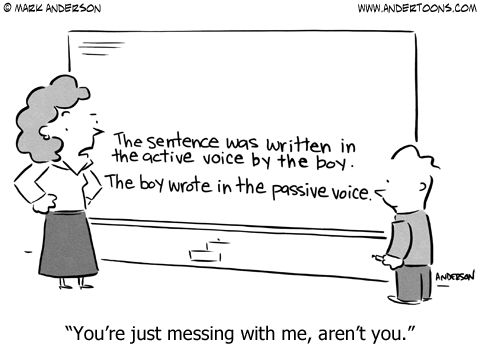
Instructional Materials for Craig White's Literature Courses
 |
 |
see also Strong Nouns & Verbs
In grammatical analysis, a clause is an essential basis of a sentence that must contain an interacting noun-subject and verb-predicate as its two basic elements.
The type of action between the verb and its subject in a clause is known as voice, which takes two forms: active and passive.
Either active or passive voice can be grammatically correct in various circumstances, but active voice occurs more frequently. Successful writing normally uses active voice more often than passive.
Passive voice is therefore grammatically competent and sometimes perfectly correct, but stylistically passive voice is generally inferior to active voice.
EXAMPLES:
ACTIVE: Tim killed the chicken hawk.
PASSIVE: The chicken hawk was killed by Tim.
(In the active example, Tim does the killing. In the passive, the chicken hawk receives the killing or gets killed.)
ACTIVE: Yesterday someone stole my books.
PASSIVE: My books were stolen by someone yesterday.
(In the first example, someone actively performed the stealing of the books. In the second example, the books were acted upon by being stolen.)
ACTIVE: Hundreds of tourists visit the statue every year.
PASSIVE: The statue is visited by hundreds of tourists every year.
(In the active example, "hundreds of tourists" perform the action of visiting. In the passive example, the statue—like the books in the example above—inactively exists and receives the action of their visits.)
![]()
|
How to recognize active and passive voice:
Does the subject act on the verb (active), or does the verb act on the subject (passive)?
When the subject is the agent or doer of the action, the verb is active voice.
When the subject receives the action or is acted on, the verb is passive voice.
|
|
Passive voice is wordier: Active voice in simple present or past tense often requires only one word to form the verb or predicate—"Tina chooses . . . " or "Tina chose . . . "—whereas passive voice requires an auxiliary verb (form of "to be") and the past participle of the operative verb: "Tina is chosen . . . " or "Tina was chosen . . . "
A recent meme on the web advises . . .
If you can insert "by zombies" after the verb, you have passive voice; e.g., "She was killed (by zombies)" = passive voice. Zombies killed (by zombies) her" = active voice.
![]()
Advantages of active voice:
1. Verbs in active voice more specifically identify agency (or the actor who's doing the action). Writers who aren't sure of the source of an action sometimes use passive voice to hide or avoid such issues; e.g., "It has been said . . . " (passive voice) instead of "Corporate leaders say . . . " (active voice).
2. Active-voice verbs are figuratively more forceful and maintain forward motion along the line of prose or argument; in transitive verbs, the action of the verb affects a direct object later in the sentence. In contrast, the action of passive verbs circles back to the clause's subject, creating a retrograde or backward motion instead of the active voice's forward motion. The comparative wordiness of most grammatical constructions increases this structural slowdown.
Forward motion: Active voice maintains the normal doer-action-receiver of action direction that conforms to the line of speech or thought in a subject-verb-object clause:
Active:
I hammered the nail and hung the picture.
Passive: The nail was
hammered and the picture was hung.
3. Efficiency or succinctness: In the following examples, the active voice requires 6 words instead of 9 to say the same thing.
Active: The waiter dropped the tray of food.
Passive: The tray of food was dropped by the waiter.
![]()
When is Passive Voice Appropriate?
Passive sentences aren't necessarily incorrect, but in most writing they shouldn't predominate.
Passive voice may be a better choice when . . .
-
the doer of the action is unknown or unneeded in the sentence; e.g. "The company was founded in 1892." Also: "The roads were cleared early this morning." (Readers are less interested in the company's founder than its longevity, or less interested in who cleared the roads than the fact they were cleared.)
- the writer wishes to emphasize the action of the sentence rather than the doer of the action; e.g. "That decision was made by my boss yesterday."
if you truly don’t know who is taking the action, then you can’t name the person. For instance, a news article might only report that "The store was robbed," because nobody knows who the robber was. Similarly, in an ongoing investigation of a brawl, “shots were fired” might be the most accurate description available.
Politicians may use passive voice intentionally to obscure the idea of who took some questionable action. Referring to the Iran-Contra scandal, President Reagan famously said, “Mistakes were made.”
Businesses sometimes use passive voice, as in "Your electricity will be shut off," rather than "We, the electric company, will be shutting off your power."
Scientists are often encouraged to write in passive voice to lend their writing a sense of objectivity—to take themselves and their actions and opinions out of the experimental results: "The DNA was sequenced,"
sources: http://en.wikipedia.org/wiki/Voice_(grammar), http://owl.english.purdue.edu/owl/resource/539/1/, http://owl.english.purdue.edu/owl/resource/539/07/, http://www.towson.edu/ows/activepass.htm, http://grammar.quickanddirtytips.com/active-voice-versus-passive-voice.aspx, http://www.writeexpress.com/active-passive.html, http://www.uark.edu/campus-resources/qwrtcntr/resources/handouts/activepassive.htm

[Explanation of joke: First sentence is written in passive
voice but mentions active voice.
Second sentence is written in active voice
but mentions passive voice.]
